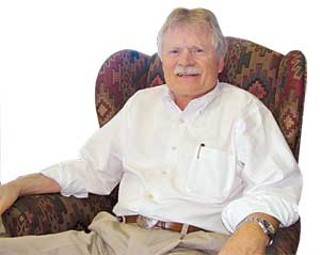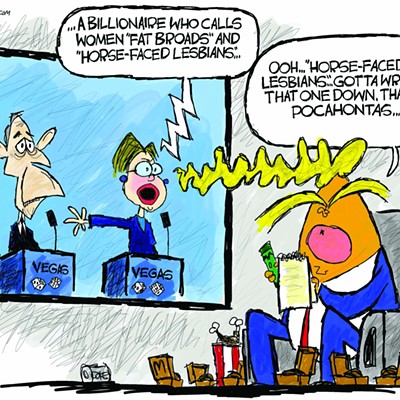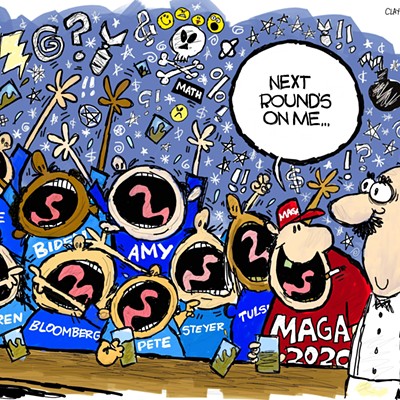On the top floors of the Pima County administration building, the feelings about Risner fall more on the reviled side. After all, since 2002, Risner and a handful of other local Democrats have made it their business to observe--and fiercely challenge--how Pima County runs its Elections Division.
Last year, these challenges culminated in a lawsuit against the Democrat-led Pima County Board of Supervisors, filed by Risner on behalf of the Pima County Democratic Party, to get databases from various recent elections, including the controversial May 2006 Regional Transportation Authority (RTA) vote, which some people claim was fixed.
A final judgment in favor of the Democratic Party--including a demand that the county pay more than $228,000 for Risner's attorney fees and expenses--was issued by Superior Court Judge Michael Miller in May. The residual sentiment from the lawsuit has been a hot topic during this election season, when two of the Democratic incumbents on the Board of Supervisors are facing opponents in the Sept. 2 primary.
Supervisors Ramón Valadez and Sharon Bronson are battling Robert Robuck and Donna Branch-Gilby, respectively. While other issues--such as water, the proposed Rosemont mine and growth--have come up in debates and TV appearances, the challengers have forced the incumbents to defend their votes against keeping the election records out of the hands of their own political party.
In July, the election-integrity fracas reached a fever pitch when Pima County Treasurer Beth Ford sent a notice to all political parties letting them know that the ballots from the RTA election had to be destroyed as required by state law--unless somebody stepped in. In response, Risner and AuditAZ, a local election-integrity group led by John Brakey, held a press conference on July 9 demanding that the ballots be preserved.
The RTA election asked voters to approve a half-cent Pima County sales-tax increase to fund road improvements and improve mass transit, with $2.1 billion being collected and spent over a 20-year period. Other recent transportation tax-increase efforts failed--but in 2006, the RTA passed. The plan itself received 60 percent approval from voters, while the tax increase to pay for that plan got 57.6 percent of the vote.
However, many activists question those results. Risner said he has proof that the RTA election was tampered with by county Elections Division employee Bryan Crane, under the direction of his boss, Brad Nelson. At that July 9 press conference, Risner produced an affidavit from Zbigniew Osmolski, described as a county whistleblower, saying that on Jan. 27, Crane told him at the Boondocks Lounge that he had changed the results of the RTA election. According to county employee records, Osmolski was fired from his county Department of Transportation job for allegedly drinking on the job and because of inappropriate behavior with female co-workers.
Risner asked state Attorney General Terry Goddard for an investigation into the matter, and requested that the RTA ballots be preserved and recounted. No objections came from Pima County Administrator Chuck Huckelberry, who made a big pitch for a recount back in January.
It wasn't the first time Risner turned to Goddard's office for help. Last year, Risner and the Democratic Party prompted an investigation by Goddard's office into the audit logs the party received that showed someone had backed up a portion of the RTA elections during early ballot counting--overwriting information that had been saved the day before.
The result was a report from Goddard's office saying that investigators didn't think criminal activity took place, even though a report following an analysis by a Colorado-based company revealed that the software used by the county has serious flaws.
Risner now looks back and says that Goddard's investigation was flawed, because the Attorney General's Office rarely confirmed information or did interviews with the party, and because the AG split the bill with the county for the analysis done on the RTA electronic-database files.
The investigation, a possible RTA recount (which the RTA itself has offered to pay for--provided the election-integrity activists repay the authority if it turns out the election was legitimate) and the possibility of criminal charges rest in Goddard's hands.
Meanwhile, some in the Democratic Party are worried the election-integrity debate has become a wedge issue within the local party--dividing the Democrats heading into a historic election.
Consider someone like Steve Farley. The midtown state House member has long been considered a stalwart of the Pima County Democrats' progressive wing, and was the driving force behind a light-rail ballot initiative that failed in 2003.
After that defeat, Farley helped craft the RTA and was an integral part of a year-long effort to convince voters to approve the measure. Those in support of the project told voters that county road infrastructure was failing, and the only way to pay for the improvements was a tax, even though several previous transportation tax-increase efforts had failed. Critics of the tax saw it failing again--and were surprised when it passed by a healthy margin.
Now, people like Farley are put in an interesting position: He's defending the RTA while at the same time going on the record to ask Goddard to do a recount, in the hopes that Pima County can put suspicions regarding the RTA vote to rest.
Farley jokes that those in election-integrity circles and those who are convinced the RTA election was flipped consider him to be an RTA sellout. Farley says he wishes that the RTA wasn't surrounded by what he considers conspiracy theories.
"I think what happened is we made a really good case and brought people together, and that's why the RTA passed. My theory is that we finally did the community building needed to do what it takes to pass one of these things in Pima County," Farley says.
"The idea that, somehow, there is a grand conspiracy of a ton of people working (to flip an election) makes more sense, or is somehow easier to accept than people working together? That's pretty absurd."
Risner has said that one thing that made him suspicious that the RTA election may have been flipped--besides the odd activity on the election audit logs--is that he remembered hearing about some polls back in 2006 that showed the RTA tax was failing. (Others say they've wondered if the RTA organizers, possibly low on funds at the time, sent out statements saying that polls showed support was down as a way to help raise money during the campaign's last leg.)
Farley says that's not true. He saw polling through the campaign that showed consistent support for the tax.
"Polling showed that we got what we expected," Farley says.
While Farley doesn't buy into speculation that the RTA vote was flipped, he does commend the Democratic Party's work on election integrity, saying it's obvious that Pima County had problems in its Elections Division that needed to be fixed.
However, he wasn't happy to see Risner call the July 9 press conference regarding the RTA. In reaction, Farley says he called Pima County Democratic Chair Vince Rabago and asked if the event was put on by the Democratic Party. He says he was assured the press conference was not a party matter.
"They've brought more transparency to elections in Pima County, but I worry the RTA press conference and this argument takes some legitimacy from the party regarding election integrity. These folks are not speaking for the Democratic Party. Vince was very clear in saying this," Farley says.
While the Democratic Party endorsed the RTA, Farley says he's not surprised that Risner is behind the recount effort, considering Risner was a vocal opponent of the RTA, going so far as to write a statement against it for the voters' guide.
The RTA debate and the presence of strong challengers to Board of Supervisors incumbents Bronson and Valadez make Farley wonder if this is part of a change taking place in the Democratic Party that is similar to what he sees happening with the Maricopa County Republican Party (and even in some places in Southern Arizona): Incumbents are often targeted by more extreme wings of their own party. In the case of the Republicans, moderate incumbents are often challenged by far-right opponents.
A Democrat who agrees with Farley is Tucson attorney Larry Hecker, who served as the treasurer of the pro-RTA campaign. Hecker currently serves as Bronson's campaign chair, worked on Nina Trasoff's run for the Tucson City Council, was chair of Shirley Scott's last City Council campaign and has been noted in the Tucson Weekly to work on occasion for legendary land speculator Don Diamond.
Hecker says he's never held a formal position in the Democratic Party, but has lent his support with "shoe leather and checkbook."
He says he's concerned to see two incumbents being challenged so aggressively by members of their own party. Hecker, like Farley, compares the political challenges to the behavior of Maricopa's extreme Republicans. Hecker says he also wonders why election integrity seems to be the sole focus of the party, when there are other issues the Democratic Party should voraciously be involved in, such as advocating for affordable health care, same-sex marriage and the environment.
"It seems to me if you focus on a single issue, you lose sight. ... I think the party has become obsessed with those issues," Hecker says.
So how does the party get back on track, in Hecker's view?
"Count the votes," he says, referring to the RTA ballots sitting in Ford's office. "Count the votes, and let's move on."
Farley, whose own re-election campaign is chaired by Supervisor Richard Elías (even though Farley is facing no opposition), is lending his support to Bronson.
"I'm hoping what happens is that Sharon wins and learned a lot from a near-death," says Farley, who is also supporting Valadez. "What we should be focusing on as a party is getting Obama elected. McCain can go negative, but Obama has a positive optimism that McCain can't overcome. But voters are cynical about government. Look at Rio Nuevo. That has certainly generated a lot of cynicism. It's too bad we don't get a lot of good stories on what government can do to help our community. They're out there."
When asked if the election-integrity/RTA issue is becoming a wedge issue that could potentially divide the Democrats between fringe elements and the more established party members who open up their checkbooks, Risner shakes his head no. The base of the party--not a fringe element, he contends--are those who support election-integrity issues, as well as a recount and an investigation from Goddard.
Regarding the comparison to Maricopa, Risner says he wonders why it's strange for the incumbents to have challengers; after all, that's the way a democracy works, he says.
"I'm not accusing Larry Hecker of being in on (the alleged election flipping). If someone rigs an election, they don't involve a bunch of people.
"They shouldn't take it personally. Maybe it passed--they got all the newspapers and everyone behind it," Risner says. "But, look: We went into this with a unanimous resolution voted on by more than 300 precinct committee members. We wanted the Democratic supervisors to work with us so we wouldn't have to sue. Everyone on the Executive Committee has voted in favor of election-integrity issues--every time. Our county party has been unanimous at every point. When you get people that don't respond to their political party, they are going to be challenged in the next election. And to suggest that's not good is anti-democratic, as far as I'm concerned."
Jeff Latas, an Oro Valley resident who serves as vice chair of the Arizona State Democratic Party and is chair of the Sonora Progressive Democrats, says he does not agree with Farley and Hecker that the RTA issue is hurting the Democratic Party. However, he does see the face of the party changing.
"I think there is a growing new establishment of the state party. The Progressive Caucus is now the largest caucus in the party. That may be changing, and maybe that is sometimes scary for other Democrats. You lose votes; you lose power," Latas says.
Latas believes that testimony from the Democrats' lawsuit against the county confirmed there were enough security flaws that an election could have been altered. A recount is the only way to cast away doubt, he says.
"I spent 21 years in service and got shot at, and my son went to Iraq. We owe it to democracy to make sure it is working. I can't agree that this has been bad for our party," Latas says.
Pima County Democratic Chair Rabago, who was honored at the state party awards dinner earlier in August as Outstanding County Chair, agrees. He says the party's involvement in elections integrity has been good for the county.
And ultimately, Rabago says, the party hasn't made election integrity its only issue. The party has been focused on getting Democrats elected, such as Rodney Glassman and Regina Romero to the Tucson City Council last year, and has continued record fundraising. The party also opened a satellite office at Ina and Oracle roads.
Rabago says he hears other county Democratic Party representatives in Arizona are impressed with the party's work on elections integrity, and that the state party is impressed, too.
"I hear gasps when we tell people what we've accomplished," he says.
And while Bill Risner may be reviled in some Pima County circles, many in the state party love him. At the aforementioned state party awards dinner, Risner was honored as the second runner-up for the Lifetime Democratic Service Award.















